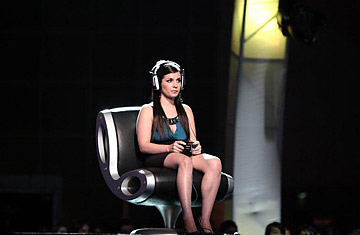
Katherine Gunn plays a video game on the reality TV show WCG Ultimate Gamer
It's the final round in a critical player vs. player bout of Tekken 6, and Katherine "Mystik" Gunn's fingers are flying across her Xbox controller, her eyes focused on the screen. A few button combinations and joystick swirls and her character, a provocatively dressed blonde martial arts master named Lily, flips her opponent over and delivers two swift kicks to knock him out. Once Gunn realizes she's won, a look of relief spreads across her face. She sits back and relaxes, soaking up the applause of the hundreds of people who turned up at Samsung Stadium in Los Angeles, Calif., to watch her compete to keep her spot on WCG Ultimate Gamer 2, a reality TV competition on the Syfy cable network. It's a lot of pressure when you're competing in video games on a national stage, but for Katherine, it's all in a day's work.
The 21-year-old Antelope Valley, Calif., native has been playing videogames professionally for five years and is now one of the top-rated female gamers in the world. She is a national champion in the fighting game Dead or Alive 4 and one of the top dozen players in the U.S. on the Xbox sci-fi shooter Halo. On Oct. 7, Gunn was declared the winner of WCG Ultimate Gamer 2 for which she received $100,000 and the chance to be the official spokesperson for World Cyber Games (WCG), the Korea-based professional gaming league.
Electronic sports might not be on everyone's radar, but for those who excel it can be a lucrative career. There are more than 20 professional international leagues, in which players from the United Kingdom to Russia to Australia to China compete in video games like Rock Band, Call of Duty: Modern Warfare 2 and Super Street Fighter 4. Top player Jonathan Wendel, 29, who goes by the gamer tag FATAL1TY, has won over $500,000 in cash and prizes so far in the 10 years he has been competing in the sport.
Most leagues focus on first-person shooter, racing and real time strategy games and offer competitions in multiple titles; even online role playing games like World of Warcraft, which has more than 12 million subscribers worldwide, are starting to give prize money for top players. The 2010 World of Warcraft Global Arena competition had a purse totaling over $200,000, with first place taking home $75,000. In the U.S., championships are broadcast on geek-focused cable channels Syfy and G4. Overseas, it's a different story: In Singapore and Korea, both with serious gaming populations, networks dedicate prime-time spots to videogame competitions and the gamer equivalent of ESPN's SportsCenter.
The fact that Gunn is a woman isn't uncommon in the gaming industry: According to a recent study by the Entertainment Software Association (ESA), almost 40% of video game players and 43% of online gamers are now women. In an arena where physical attributes like strength, speed and stamina — ones that traditionally have kept men and women from competing head to head — no longer apply, you'd think the sexes would be able to share a level playing field. But only in the past five years or so, once professional leagues like WCG began creating women-only divisions to encourage more female gamers, did they start going pro in more numbers; today, WCG officials estimate 20% of professional gamers are women, some of whom earn salaries of up to $60,000 a year. Top male players, however, earn up to $100,000. For a long time it was hard for female gamers to find sponsorships; many traditional advertisers like electronics manufacturers and game software companies were afraid that male gamers wouldn't take seriously a product endorsed by a woman.
That's now starting to change. "Corporations are much more interested in diversifying who they are talking to," WCG marketing and operations manager Paul Brewer says, regarding finding sponsors for professional gaming leagues. "If women buy your products, men will buy your products. They're obviously interested in getting to that female gamer." Gunn estimates that two out of every five people she runs into in gaming conventions these days are women — and those who go pro are winning against the guys.
